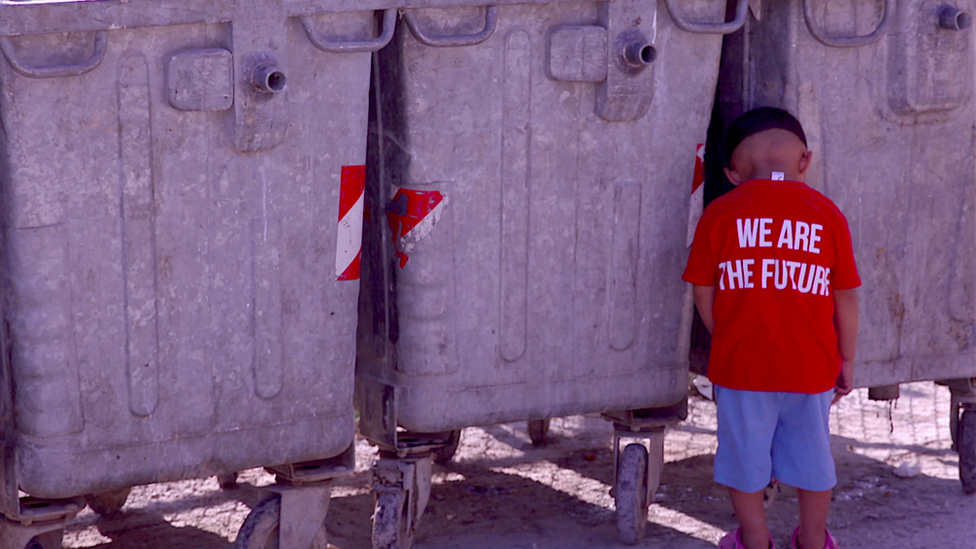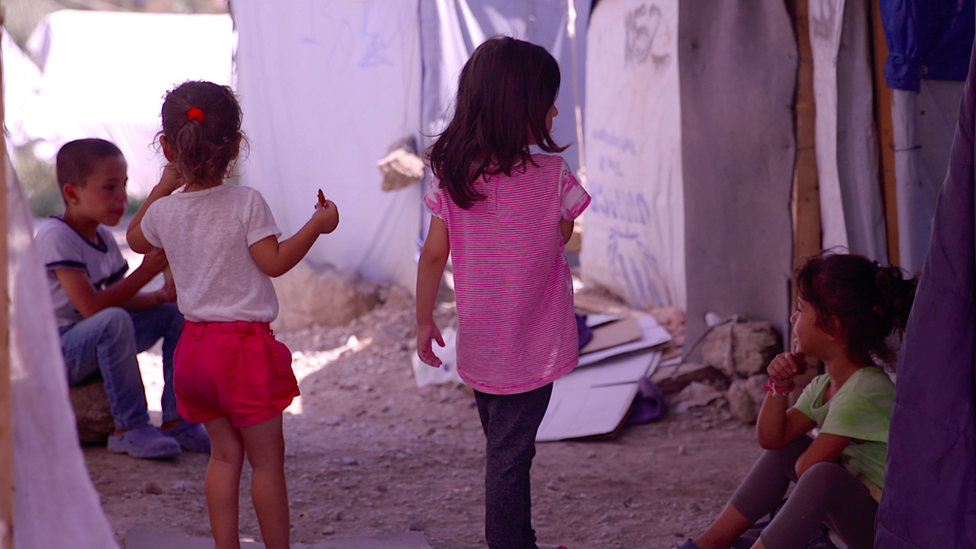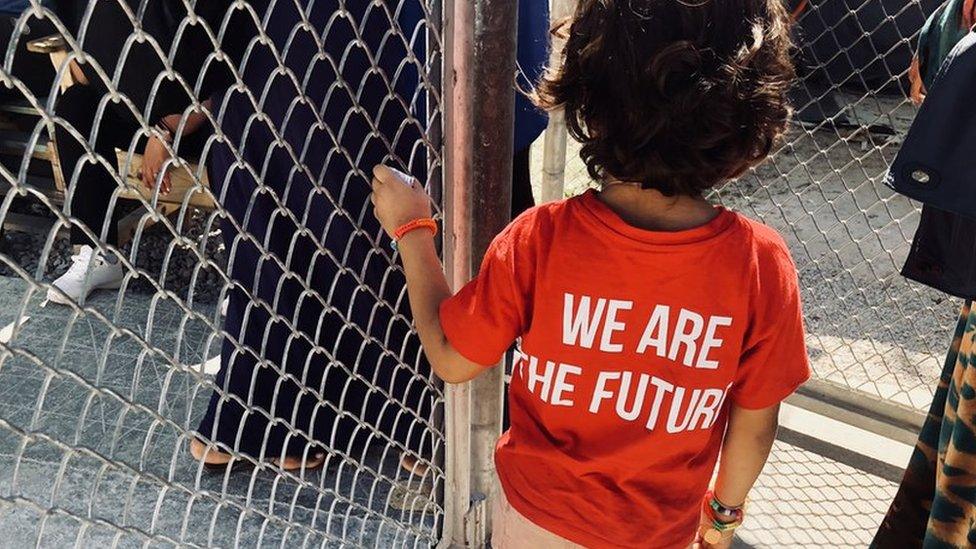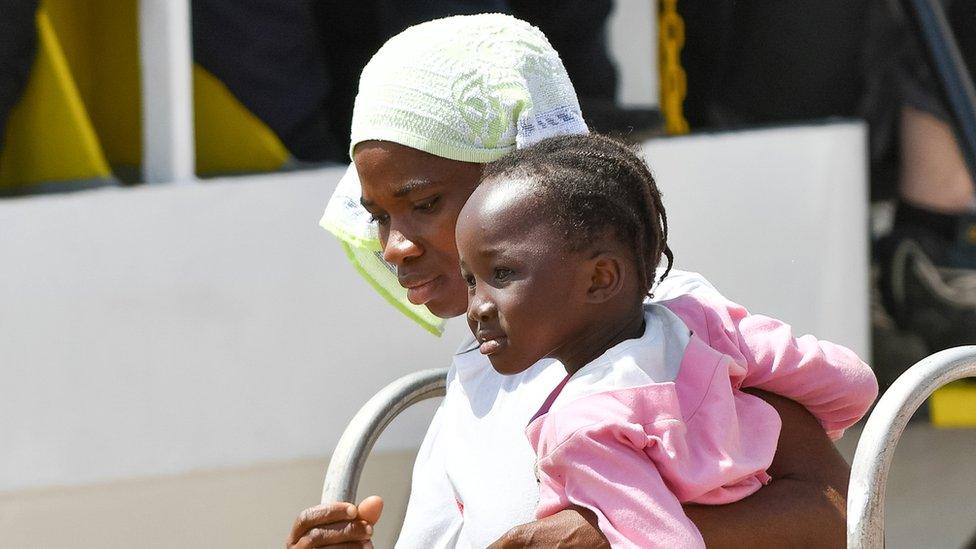UN urges Greece to act as Moria refugee camp reaches 'boiling point'
- Published
Asylum seekers at Moria camp on Lesbos have complained of deadly violence
The UN refugee agency has urged Greece to move asylum seekers off Lesbos after the Victoria Derbyshire programme exposed appalling conditions.
It said the Moria camp was "reaching boiling point" and the Greek government should rapidly speed up the process of transferring people to the mainland.
The camp has capacity for about 2,000 but is currently home to some 8,000, with violence and sexual assault rife.
The Greek government has been approached for comment.
Living standards inside the camp are so bad that many charities refuse to operate inside in protest. The day we filmed there, two people were stabbed in the lunch queue.

Some children at the camp have respiratory diseases from tear gas fired by police to quell fights
"We are particularly concerned about woefully inadequate sanitary facilities, fighting amongst frustrated communities, rising levels of sexual harassment and assaults and the increasing need for medical and psycho-social care," Charlie Yaxley, spokesman for the UN High Commissioner for Refugees (UNHCR), told a Geneva briefing.
Mr Yaxley said the Greek government had made previous commitments to transfer people to shelters on the mainland and had received European Union funding for it.
The UNHCR called on the Greek authorities to rapidly speed up transfer of those eligible to mainland Greece and to increase capacity on the mainland to house them.
It also urged them to quickly improve conditions in camps on the Greek islands and to provide alternative accommodation for the most vulnerable.
Moria camp was meant to be a "reception and identification centre" (RIC), rather than a refugee camp housing people for extended periods of time. It does not meet the standards required to be an official camp.
Lawyers working inside say that, in the worst cases, some people have been there for two years.

Moria refugee camp on the island of Lesbos suffers from overcrowding and violence
The UNHCR said that despite 1,350 refugees and asylum seekers being transferred to mainland sites in August, that had failed to ease pressure because an average of 114 people arrived each day during the same month, up from 83 in July.
It said more than 70% were families from Syria, Iraq and Afghanistan.


Earlier this week, medical charity MSF told the BBC that children as young as 10 were trying to take their lives inside Moria camp.
The place smelt of raw sewage and there were around 70 people per toilet, it said.
Reacting to the UN statement Louise Roland-Gosselin, head of mission for MSF in Greece, said immediate action was needed.
"This is a crisis in overcrowding - a health and mental-health crisis and a crisis of protection" she said.
"Our medical teams and experts expect to treat people for trauma they have experienced in their country of origin. But they are treating trauma that has happened in Greece.
"We have children as young as 10 who are suicidal because of the fear and desperation they have faced in Greece."
The UN also criticised overcrowding on other Greek islands, adding that another centre on Samos holds 2,700 people, nearly four times the number it was designed for.
Centres on the islands of Chios and Kos are at close to double their capacity.
On Thursday, the European Commission said it had seen the BBC report about Moria and was carefully monitoring the spending of €1.6m (£1.43m) allocated to Greece for migrant reception centres and improving conditions.
It said there had been a "difficulty on the Greek side" in making use of the funds.
Watch the BBC's Victoria Derbyshire programme on weekdays between 09:00 and 11:00 BST on BBC Two and the BBC News Channel in the UK and on iPlayer afterwards.
- Published28 August 2018

- Published11 September 2018
